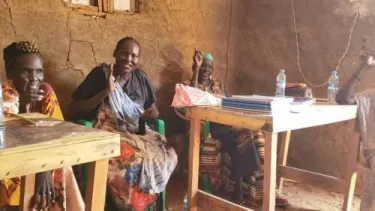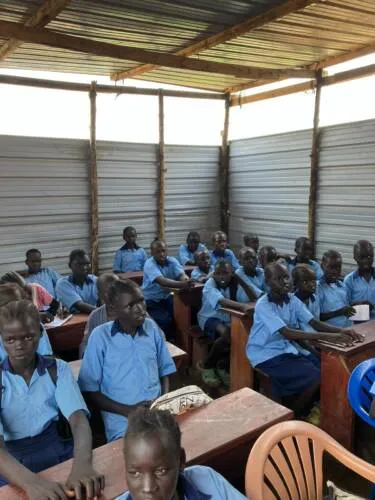Stories of Hope and Healing
A Letter from Kristi and Bob Rice, mission co-workers serving in South Sudan
Subscribe to our co-worker letters
Dear friends,
We sat with five women from Eden church in Juba, engrossed as the women shared their experiences of war. At one point they tried to demonstrate the challenge of fleeing from war with their children, showing how they would tie the smallest child on their back with their ‘lawa’ or outer garment, then other children would hold onto their mother’s skirt or hands. Then running, trying to find safety when people are being killed around them.

Emily, a student at Pittsburgh Theological Seminary, visited South Sudan in June to learn how people are finding hope and healing after periods of conflict and trauma. She asked these women at Eden church to share a story that showed the impact of the war on their lives or communities. Martha* was in Juba when civil war broke out in 2013, and she shared the horror of seeing people killed in her neighborhood and of her community being targeted. She and her children joined a group of people who fled Juba on foot, walking for weeks toward the north, until they ended up in a camp near Khartoum. Ten years later, when war broke out in Sudan, she prepared to return to South Sudan. But her children, older now but still traumatized by the war that they fled in 2013 in South Sudan, refused to return with her. They fled instead to Libya and Egypt, and Martha now mourns that they are suffering there, and she may never see them again.
I joined Emily for another small group interview at a church in the Lologo neighborhood of Juba. Ogud shared how his father was killed in the war when he was a child, and others in his family instilled in him the idea that it was his responsibility to avenge the death of his father by killing someone from the group responsible for his death. Mary described jumping into their ‘holes’ as a child whenever they heard the Antonov bomber planes overhead, and how scared and alone she felt. Over nine years of these frequent attacks, she thought this way of life was normal since everyone in her community had the same experience. Each person in the group expressed their hopes for South Sudan before independence came – that there would be security and freedom of movement, jobs, free school for the children and medical care. When none of that materialized, they felt disillusioned and let down.

Then Emily also asked each group what gave them hope and whether they had any stories of healing. Ogud shared how the Word of God has helped him, particularly a sermon he heard in church about forgiveness that included a story about someone in Rwanda who lost all his family and forgave them. Ogud thought, “Could I also do that?” He felt like he was chained in a hole. Now he feels light. “Forgiveness is freedom,” he says, and he encourages others to break the cycle of revenge and violence that is fueling local conflicts. Mary described attending a Healing Hearts Transforming Nations workshop in Rwanda and how emotional and healing it was to be able to share some of the pain from her childhood with someone and then give over the pain to Jesus.
The women at the Eden church said that they gather twice a week to sing, encourage each other, and pray. “Singing together and the Word of God makes us strong,” they said. The Eden congregation recently started a primary school, and they keep fees low or free for those who cannot afford them. The women expressed how comforting it is for them that their children can learn and get a meal at the school. The ongoing economic crisis in South Sudan and the lack of employment means that getting food is a daily struggle. The women thanked us for coming and said that just being able to share their stories with us relieved the pain.
Wow! Sitting with each of these groups and listening to their stories felt sobering and sacred. I was humbled by each person’s willingness to share some of their painful past and the ongoing struggle in the present. In Matthew 25:40, Jesus explains how the King will affirm the ‘mundane’ actions of kindness that His people did for those who were suffering. “The King will reply, ‘Truly I tell you, just as you did it to one of the least of these who are members of my family, you did it to me.’” This is one of the gifts of living in South Sudan – bearing witness to the ways that God’s people minister to each other, quietly, faithfully, and sacrificially. God is bringing hope and healing as churches preach God’s love and forgiveness, meet together to pray, sing, and encourage each other, and also meet some of the practical needs of the most vulnerable around them.

Please pray for God’s people in South Sudan as we continue to faithfully witness to the hope and life that we find in Jesus Christ through these practical means. High inflation this year in South Sudan and the influx of more than 700,000 people who have fled the war in Sudan means getting food each day is increasingly difficult. The South Sudan Presbyterian Evangelical Church is an inspiring example of communities of faith who are loving the people around them in practical ways and experiencing God’s power and peace in the midst of suffering.
Thank you for reading this letter – your interest and especially your prayers encourage us and our colleagues in South Sudan. Thank you also for your financial support towards our ministry and this partnership with churches in South Sudan. If you would like to give a special contribution towards the ministries of the South Sudan Presbyterian Evangelical Church, the account to give through PC(USA) is E052148.
As we say often in South Sudan, may the “grace of our Lord Jesus Christ, the love of God the Father, and the fellowship of the Holy Spirit be with you.”
With love and gratitude,
Bob and Kristi
*Names of people who shared their stories have been changed for confidentiality.
,
